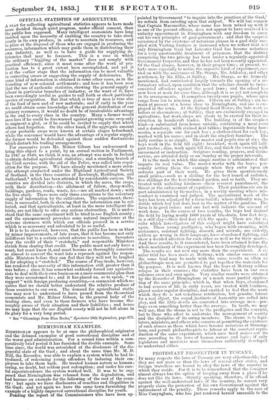OFFICIAL STATISTICS OF AGRICULTURE.
A rtiN for collecting agricultural statistics appears to have made more decided though quiet progress, under official consent, than the public has supposed. Many intelligent economists have long insisted upon the necessity of enabling the country to take stock yearly in its own produce, in order to ascertain its resources, and to place at the disposal of those who are engaged in producing the resources, information which may guide them in distributing their own industry, as well as to have a guide for supplying de- ficiencies that may be foreseen. This is a case in which the ordinary " higgling of the market" does not comply with practical efficiency, since it must come after the work of pro- duction has to a great extent been accomplished, and yet it is at the earlier stage that the information can be most valuable in correcting errors or suggesting the supply of deficiencies. The i same kind of information s obtained in some other cases, as in the founding of new colonial settlements ; and here it has been seen that the use of authentic statistics showing the general supply of labour in particular branches of industry' or the want of it, have been exceedingly useful as guides to call forth or check particular species of emigration. But that which is true of men is true also of the food of men and of raw materials ; and if early in the year we could obtain some knowledge of the general distribution of our primary resources, it would no doubt be of incalculable advantage in the end to every class in the country. Many a farmer would save loss if he could be forewarned against growing some crop only to augment a glut, or if he could be invited to supply that which others had forgotten. On the other hand, if the aggregate amount of our probable crops were known at certain stages beforehand, while the consumer would have the advantage of a regular supply, the farmer would be defended against those sudden fluctuations which disturb his tradine.b arrangements. For successive years Mr. Milner Gibson has endeavoured to bring this object to a point, by an annual motion in Parliament. In 1847 or 1848, we think it was, an attempt was made in Ireland to obtain detailed agricultural statistics ; and a standing branch of the Civil service, with the aid of the Police, was called into requi- sition for the purpose. We have already mentioned a more scien- tific attempt conducted under the Highland Agricultural Society. of Scotland, in the three counties of Roxburgh, Haddington, and Sutherland,* which has been attended by considerable success. The counties are divided into districts, in which the acres, the crops, with their distribution—the allotment of fallow, sheep-walks, buildings, gardens roads, waste, &c.—are all marked down ; with the live stock. There were only three exceptions to the voluntary supply of information by the cultivators. The experiment, there- fore, is successful, both in showing that the information can be col- lected, and that agriculturists, at least in the more intelligent dis- tricts, are not likely to offer any serious obstruction. It is under- stood that the same experiment will be tried in one English county ; and the announcement provokes some natural impatience at the extreme slowness with which our officials proceed in a service which is so necessary and calculated to be so useful.
It is to be observed, however, that the public has been so blasé by minor improvements, of late years, that it has become not only indifferent but to a certain extent adverse to novelties. Inventors bear the credit of their " crotchets," and responsible Ministers shrink from sharing that credit. The public must not only have a want, but must know it, and must become so thoroughly conscious as almost to convert the want into a reproach against the respon- sible Ministers before they can feel that they will not be laughed at for adopting a "crotchet." The course of Free-trade, however, has rendered the necessity of this information still greater than it was before ; since it has somewhat suddenly forced our agricultu- rists to deal with their own business on a more commercial plan than they were accustomed to ; and it has placed us, so to speak, "en rapport" with foreign producing countries,—a connexion which re- quires that we should better understand the relative produce of those countries to our own. The demand for agricultural statis- tics may now be understood to have passed from the theoretical economists and Mr. Milner Gibson, to the general body of the trading class, and even to those farmers who have become tho- roughly aware of their situation and their liabilities ; and hence we may hope that the one English county will not be left alone in its glory for a very long period.
* See "Gleanings from Blue Books," Spectator 10th September, page 879.


























 Previous page
Previous page